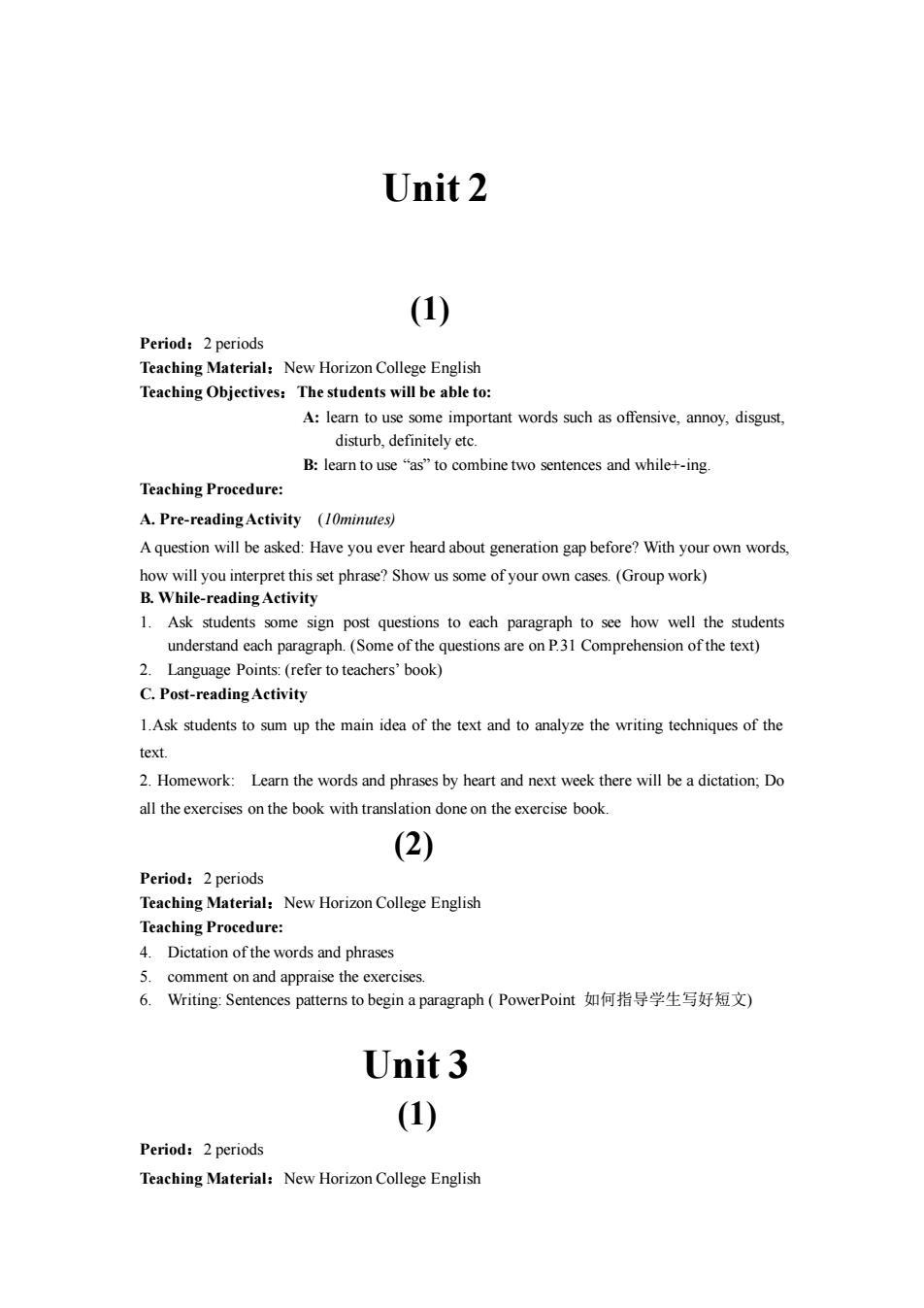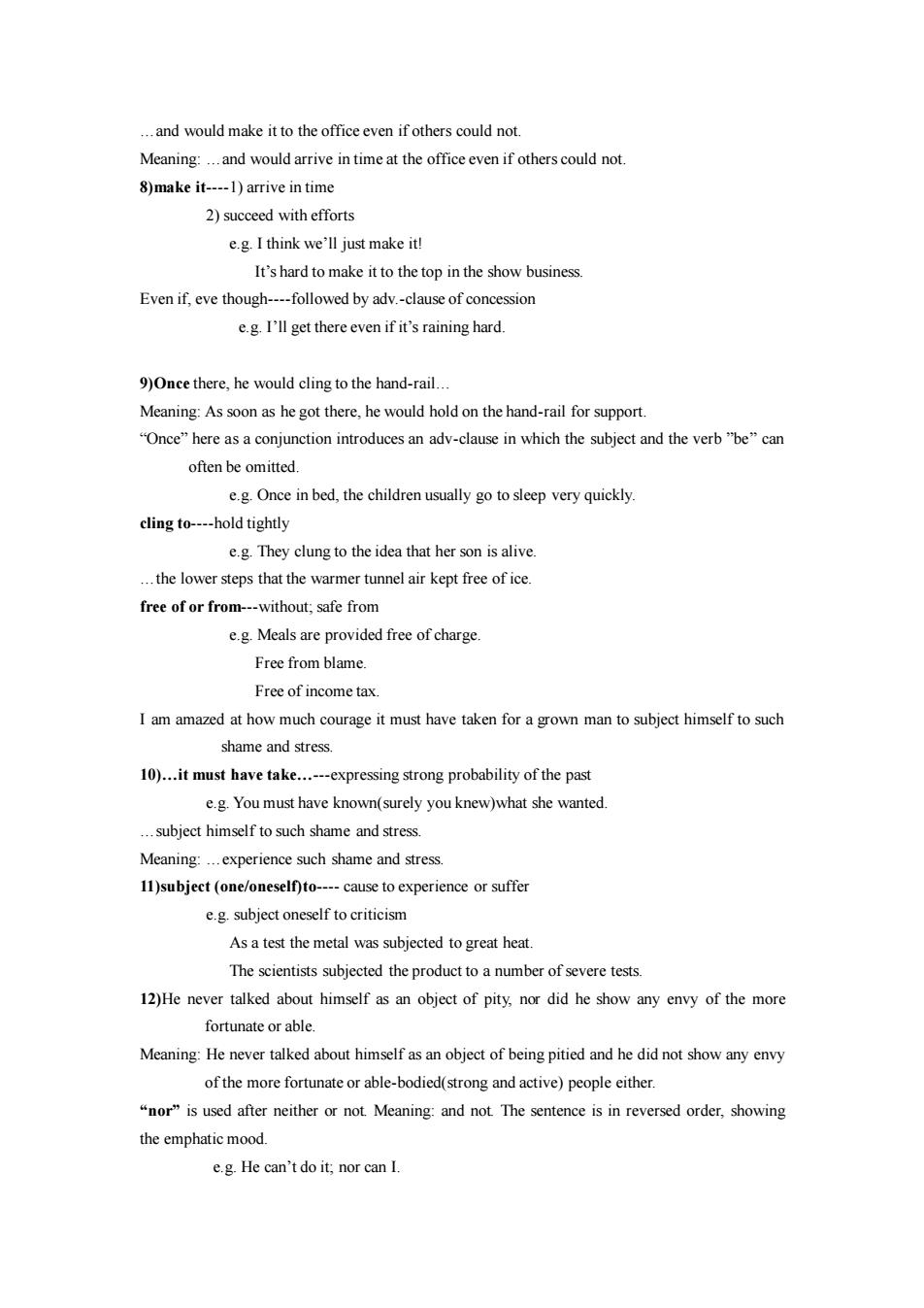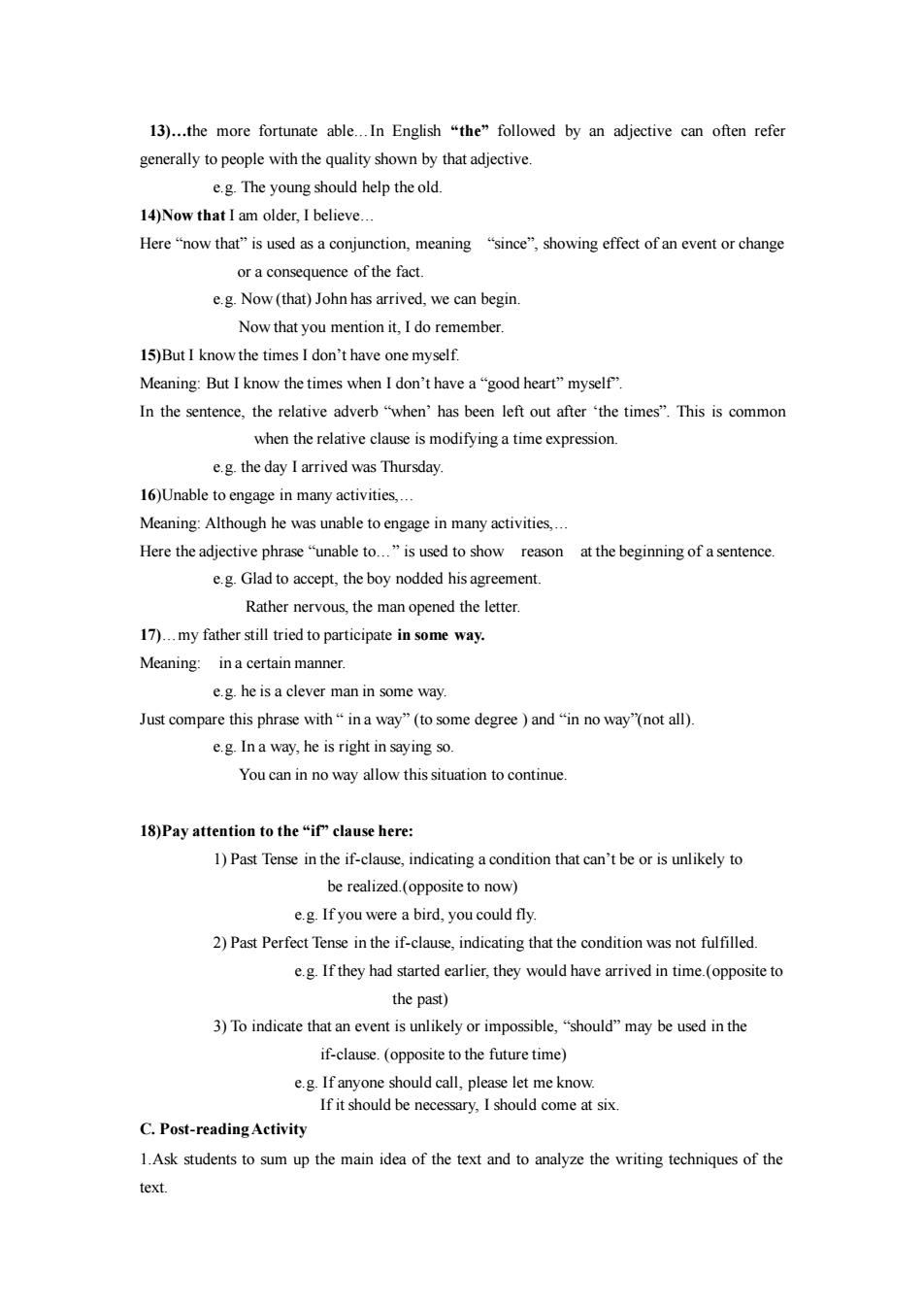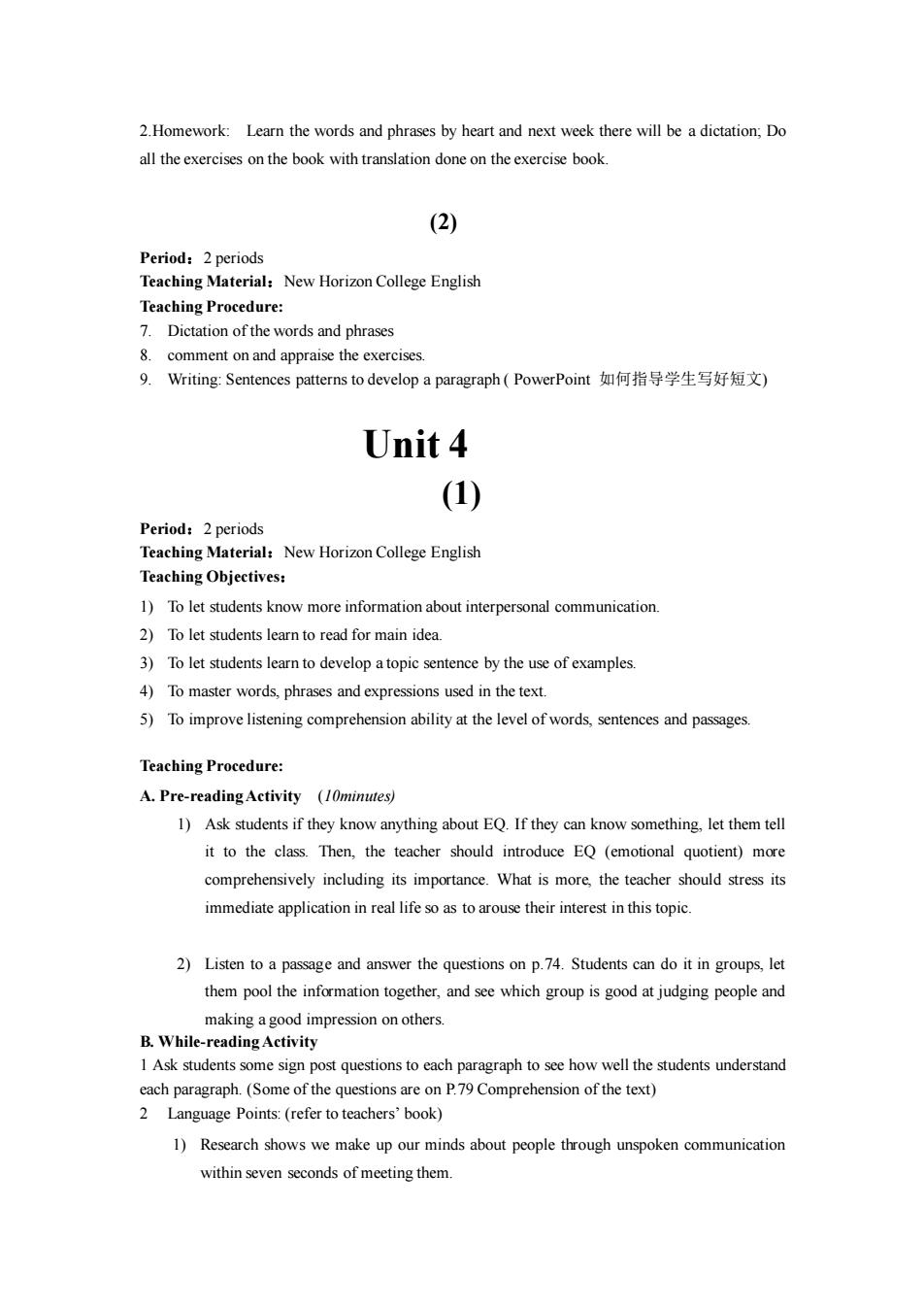
Unit 2(1)Period:2periodsTeaching Material:New Horizon College EnglishTeaching Objectives: The students will be able to:A: learn to use some important words such as offensive, annoy, disgust,disturb, definitely etc.B: learn to use “as” to combine two sentences and while+-ing.TeachingProcedure:A.Pre-readingActivity(1Ominutes)Aquestion will be asked:Haveyou ever heardaboutgenerationgapbefore?Withyour own wordshow will you interpret this set phrase? Show us some of your own cases. (Group work)B.While-readingActivity1.Ask students some sign post questions to each paragraph to see how well the studentsunderstand each paragraph. (Some of the questions are on P.31 Comprehension of the text)2.Language Points: (refer to teachers' book)C.Post-readingActivity1.Ask students to sum up the main idea of the text and to analyze the writing techniques of thetext.2.Homework:Learn the words and phrases by heart and next week therewill bea dictation; Doall theexercises on thebook withtranslation done on the exercise book(2)Period:2 periodsTeaching Material: New Horizon College EnglishTeaching Procedure:4.Dictationofthewordsandphrases5.comment on and appraise the exercises6.Writing:Sentences patternstobeginaparagraph(PowerPoint如何指导学生写好短文)Unit 3(1)Period:2 periodsTeachingMaterial:NewHorizonCollegeEnglish
Unit 2 (1) Period:2 periods Teaching Material:New Horizon College English Teaching Objectives:The students will be able to: A: learn to use some important words such as offensive, annoy, disgust, disturb, definitely etc. B: learn to use “as” to combine two sentences and while+-ing. Teaching Procedure: A. Pre-reading Activity (10minutes) A question will be asked: Have you ever heard about generation gap before? With your own words, how will you interpret this set phrase? Show us some of your own cases. (Group work) B. While-reading Activity 1. Ask students some sign post questions to each paragraph to see how well the students understand each paragraph. (Some of the questions are on P.31 Comprehension of the text) 2. Language Points: (refer to teachers’ book) C. Post-reading Activity 1.Ask students to sum up the main idea of the text and to analyze the writing techniques of the text. 2. Homework: Learn the words and phrases by heart and next week there will be a dictation; Do all the exercises on the book with translation done on the exercise book. (2) Period:2 periods Teaching Material:New Horizon College English Teaching Procedure: 4. Dictation of the words and phrases 5. comment on and appraise the exercises. 6. Writing: Sentences patterns to begin a paragraph ( PowerPoint 如何指导学生写好短文) Unit 3 (1) Period:2 periods Teaching Material:New Horizon College English

Teaching Objectives for the Text1.Words,Phrases and Expressions of theText (toput the stress onthe word formation and theusage of the phrases and expressions)2.Sentence Structure (even though, once, adj.And adv. Clauses).3.Text Structure of the text (text structure analysis)XUnderstanding of the Text (listening, thinking and reading)Teaching Procedure:A.Pre-readingActivity(10 minutes)What is most important personality to a person? (Group work)B.While-readingActivity3.Ask students some sign post questions to each paragraph to see how well the studentsunderstand each paragraph. (Some of the questions are on P.31 Comprehension of the text)4.Language Points:I) help---followed by "to" infinitive without "to".See... helped...keep my balance.2)keepanybalance----keeptheeven or equal state ofmymind orfeeling orbody3) inwardly----inner, inside, especially in the mind or spirit. Compare with outwardly4)Ifheevernoticedorwasbothered, heneverletonMeaning:If he at anytime noticed or felt troubledbythis, hewould never letanyone seeorknowhow he feellet on----reveal a secrete.g. He knew where the boy was hiding, but he didn't let on.Nowhere“if-clause”is showingareal condition.Thatmeans it happened5)coordinate--put into proper relatione.g.to coordinate ideasThe prefix co- means together with.6)You set the pace, I will try to adjust to you.Meaning: You decided the speed of walking and I'll try to change my speed and keep up to yours.set the pace---set the speedadjust---followed by “"to" prep.e.g. My eyes haven't adjusted to the dark in the room yet.Hewentto work sickMeaning:hewenttoworkevenwhenhewas sick.e.g. He went to bed hungry last night.I can't drink it hot.7)...despite nasty weather.Meaning. ...even with terrible weather......although the weather was very bad..e.g.I went out despite (in spite of)the rainDespite(in spite of) mistakes and weakness, it is a good composition
Teaching Objectives for the Text 1. Words, Phrases and Expressions of the Text (to put the stress on the word formation and the usage of the phrases and expressions). 2. Sentence Structure (even though, once, adj. And adv. Clauses). 3. Text Structure of the text (text structure analysis) 4. Understanding of the Text (listening, thinking and reading). Teaching Procedure: A. Pre-reading Activity (10 minutes) What is most important personality to a person? (Group work) B. While-reading Activity 3. Ask students some sign post questions to each paragraph to see how well the students understand each paragraph. (Some of the questions are on P.31 Comprehension of the text) 4. Language Points: 1) help-followed by “to” infinitive without “to”. See:.helped.keep my balance. 2) keep any balance-keep the even or equal state of my mind or feeling or body. 3) inwardly-inner, inside, especially in the mind or spirit. Compare with outwardly 4) If he ever noticed or was bothered, he never let on. Meaning: If he at any time noticed or felt troubled by this, he would never let anyone see or know how he feel. let on-reveal a secret e.g. He knew where the boy was hiding, but he didn’t let on. Now here “if-clause” is showing a real condition. That means it happened. 5)coordinate-put into proper relation e.g. to coordinate ideas The prefix co- means together with. 6)You set the pace, I will try to adjust to you. Meaning: You decided the speed of walking and I’ll try to change my speed and keep up to yours. set the pace-set the speed adjust-followed by “to” prep. e.g. My eyes haven’t adjusted to the dark in the room yet. He went to work sick. Meaning: he went to work even when he was sick. e.g. He went to bed hungry last night. I can’t drink it hot. 7).despite nasty weather. Meaning: .even with terrible weather. .although the weather was very bad. e.g. I went out despite (in spite of) the rain. Despite(in spite of) mistakes and weakness, it is a good composition

..andwouldmake ittotheofficeeven if others couldnotMeaning:..and wouldarriveintimeattheofficeeven if others couldnot8)make it----1) arrive in time2)succeed with effortse.g. I think we'll just make it!It'shard to make it to thetop in the showbusiness.Even if,eve though---followed by adv.-clause of concessione.g. I'll get there even if it's raining hard9)Once there, he would cling to the hand-rail..Meaning: As soon as he got there, he would hold on the hand-rail for support."Once"here as a conjunction introduces an adv-clause in which the subject and the verb"be"canoftenbeomittede.g. Once in bed, the children usually go to sleep very quicklycling to---hold tightlye.g.They clung to the idea that her son is alive....the lower steps that the warmer tunnel air kept free oficefree oforfrom---without, safefrome.g.Meals are provided free of charge.Freefromblame.Free of income tax.I am amazed athowmuch courage itmust havetakenforagrownmantosubject himself to suchshame and stress.10)...it must have take...---expressing strong probability of the paste.g. You must have known(surely you knew)what she wanted....subjecthimselftosuchshameandstress.Meaning:... experience such shame and stress.1l)subject (one/oneself)to----causetoexperienceor suffere.g.subject oneself to criticismAs a test the metal was subjected to great heat.The scientists subjected the productto a number of severetests12)He never talked about himself as an object of pity, nor did he show any envy of the morefortunate or ableMeaning: He never talked about himself as an object of being pitied and he did not show any envyof the morefortunateorable-bodied(strong and active)people either."nor" is used after neither or not. Meaning: and not The sentence is in reversed order, showingthe emphatic mood.e.g. He can't do it, nor can I
.and would make it to the office even if others could not. Meaning: .and would arrive in time at the office even if others could not. 8)make it-1) arrive in time 2) succeed with efforts e.g. I think we’ll just make it! It’s hard to make it to the top in the show business. Even if, eve though-followed by adv.-clause of concession e.g. I’ll get there even if it’s raining hard. 9)Once there, he would cling to the hand-rail. Meaning: As soon as he got there, he would hold on the hand-rail for support. “Once” here as a conjunction introduces an adv-clause in which the subject and the verb ”be” can often be omitted. e.g. Once in bed, the children usually go to sleep very quickly. cling to-hold tightly e.g. They clung to the idea that her son is alive. .the lower steps that the warmer tunnel air kept free of ice. free of or from-without; safe from e.g. Meals are provided free of charge. Free from blame. Free of income tax. I am amazed at how much courage it must have taken for a grown man to subject himself to such shame and stress. 10).it must have take.-expressing strong probability of the past e.g. You must have known(surely you knew)what she wanted. .subject himself to such shame and stress. Meaning: .experience such shame and stress. 11)subject (one/oneself)to- cause to experience or suffer e.g. subject oneself to criticism As a test the metal was subjected to great heat. The scientists subjected the product to a number of severe tests. 12)He never talked about himself as an object of pity, nor did he show any envy of the more fortunate or able. Meaning: He never talked about himself as an object of being pitied and he did not show any envy of the more fortunate or able-bodied(strong and active) people either. “nor” is used after neither or not. Meaning: and not. The sentence is in reversed order, showing the emphatic mood. e.g. He can’t do it; nor can I

13)...the more fortunate able...In English“the” followed by an adjective can often refergenerally to people with the quality shown by that adjective.e.g. The young should help the old14)Now that I am older, I believe...Here“nowthat"is used as a conjunction, meaning“"since",showing effect of an event or changeora consequence of the facte.g. Now (that) John has arrived, we can begin.Now that you mention it, I do remember.15)ButIknowthetimesIdon'thaveonemyself.Meaning:But I know the times when I don't have a“good heart"myself"In the sentence, the relative adverb“when'has been left out after“the times".This is commonwhen the relative clause is modifying a time expressione.g.the day Iarrived was Thursday16)Unable to engage in many activities,.Meaning: Although he was unable to engage in many activities,...Here theadjective phraseunable to..."is used to showreasonat thebeginning of a sentence.e.g. Glad to accept, the boy nodded his agreement.Rather nervous, theman opened the letter17)...my father still tried to participate in some way.Meaningina certainmanner.e.g. he is a clever man in some way.Just compare this phrase with" in a way" (to some degree)and “in no way(not all).e.g. In a way, he is right in saying so.You can in no way allow this situation to continue.18)Pay attention to the"if"clause here:1) Past Tense in the if-clause, indicating a condition that can't be or is unlikely toberealized.(oppositetonow)e.g. If you were a bird, you could fly2) Past Perfect Tense in the if-clause, indicating that the condition was not fulfillede.g. If they had started earlier, they would have arrived in time.(opposite tothe past)3)To indicatethataneventisunlikelyorimpossible,“shouldmaybeused intheif-clause. (opposite to the future time)e.g. If anyone should call, please let me know.If it should be necessary, I should come at six.C.Post-readingActivity1.Ask students to sum up the main idea of the text and to analyze the writing techniques of thetext
13).the more fortunate able.In English “the” followed by an adjective can often refer generally to people with the quality shown by that adjective. e.g. The young should help the old. 14)Now that I am older, I believe. Here “now that” is used as a conjunction, meaning “since”, showing effect of an event or change or a consequence of the fact. e.g. Now (that) John has arrived, we can begin. Now that you mention it, I do remember. 15)But I know the times I don’t have one myself. Meaning: But I know the times when I don’t have a “good heart” myself”. In the sentence, the relative adverb “when’ has been left out after ‘the times”. This is common when the relative clause is modifying a time expression. e.g. the day I arrived was Thursday. 16)Unable to engage in many activities,. Meaning: Although he was unable to engage in many activities,. Here the adjective phrase “unable to.” is used to show reason at the beginning of a sentence. e.g. Glad to accept, the boy nodded his agreement. Rather nervous, the man opened the letter. 17).my father still tried to participate in some way. Meaning: in a certain manner. e.g. he is a clever man in some way. Just compare this phrase with “ in a way” (to some degree ) and “in no way”(not all). e.g. In a way, he is right in saying so. You can in no way allow this situation to continue. 18)Pay attention to the “if” clause here: 1) Past Tense in the if-clause, indicating a condition that can’t be or is unlikely to be realized.(opposite to now) e.g. If you were a bird, you could fly. 2) Past Perfect Tense in the if-clause, indicating that the condition was not fulfilled. e.g. If they had started earlier, they would have arrived in time.(opposite to the past) 3) To indicate that an event is unlikely or impossible, “should” may be used in the if-clause. (opposite to the future time) e.g. If anyone should call, please let me know. If it should be necessary, I should come at six. C. Post-reading Activity 1.Ask students to sum up the main idea of the text and to analyze the writing techniques of the text

2.Homework:Learn the words and phrases by heart and next week there will be a dictation, Doall theexercises on thebook withtranslation done on the exercisebook.(2)Period: 2 periodsTeachingMaterial:NewHorizonCollegeEnglishTeaching Procedure:7.Dictation of the words and phrasescommentonand appraisetheexercises9.Writing:Sentencespatternstodevelopaparagraph(PowerPoint如何指导学生写好短文)Unit 4(1)Period:2periodsTeachingMaterial:NewHorizon CollegeEnglishTeachingObjectives:1)To let studentsknowmore information about interpersonal communication2)Tolet studentslearntoreadformain idea3)To let students learn to develop a topic sentence by the use of examples.4)Tomaster words,phrases and expressions used inthetext.5)To improve listening comprehension ability at the level ofwords, sentences and passages.Teaching Procedure:A.Pre-readingActivity(1Ominutes)1)Ask students iftheyknowanything aboutEQ.Iftheycanknow something,letthemtellittotheclass.Then,theteacher should introduceEQ(emotional quotient)morecomprehensively including its importance. What is more, the teacher should stress itsimmediate application in real life so as to arouse their interest in this topic.2) Listen to a passage and answer the questions on p.74. Students can do it in groups, letthem pool the information together, and see which group is good at judging people andmaking a good impression on others.B. While-readingActivity1 Ask students some sign post questions to each paragraph to seehow wellthe students understandeachparagraph.(SomeofthequestionsareonP.79Comprehensionofthetext)2Language Points: (refer to teachers' book)1)Researchshowswemakeup ourmindsaboutpeoplethroughunspokencommunicationwithinseven secondsofmeetingthem
2.Homework: Learn the words and phrases by heart and next week there will be a dictation; Do all the exercises on the book with translation done on the exercise book. (2) Period:2 periods Teaching Material:New Horizon College English Teaching Procedure: 7. Dictation of the words and phrases 8. comment on and appraise the exercises. 9. Writing: Sentences patterns to develop a paragraph ( PowerPoint 如何指导学生写好短文) Unit 4 (1) Period:2 periods Teaching Material:New Horizon College English Teaching Objectives: 1) To let students know more information about interpersonal communication. 2) To let students learn to read for main idea. 3) To let students learn to develop a topic sentence by the use of examples. 4) To master words, phrases and expressions used in the text. 5) To improve listening comprehension ability at the level of words, sentences and passages. Teaching Procedure: A. Pre-reading Activity (10minutes) 1) Ask students if they know anything about EQ. If they can know something, let them tell it to the class. Then, the teacher should introduce EQ (emotional quotient) more comprehensively including its importance. What is more, the teacher should stress its immediate application in real life so as to arouse their interest in this topic. 2) Listen to a passage and answer the questions on p.74. Students can do it in groups, let them pool the information together, and see which group is good at judging people and making a good impression on others. B. While-reading Activity 1 Ask students some sign post questions to each paragraph to see how well the students understand each paragraph. (Some of the questions are on P.79 Comprehension of the text) 2 Language Points: (refer to teachers’ book) 1) Research shows we make up our minds about people through unspoken communication within seven seconds of meeting them